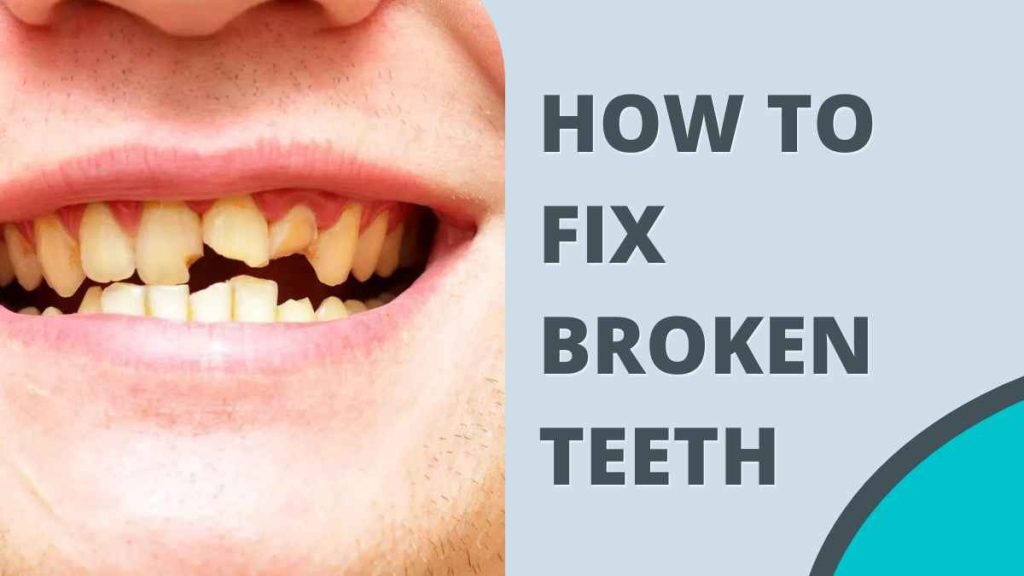How to Fix Broken Teeth! Welcome to our comprehensive guide on fixing broken teeth! We understand that dealing with a cracked or broken tooth can be both painful and perplexing. Fortunately, there are effective ways to address this issue and restore your smile. In this article, we will explore How to Fix Broken Teeth. Here we will explore why people get cracked or broken teeth, provide a step-by-step guide on how to fix broken teeth, discuss various types of cracked teeth, offer temporary at-home treatments, provide tips on caring for a chipped or broken tooth, highlight common mistakes to avoid, share useful tips and tricks, present interesting facts about broken teeth, and conclude with essential insights.
Table of Contents
Why People Get Cracked or Broken Teeth
Cracked or broken teeth can result from various factors, such as accidents, trauma, biting on hard objects, teeth grinding, or tooth decay. These incidents can cause immense discomfort and impact your overall dental health.
How to Fix Broken Teeth: A Step-by-Step Guide
Here you can check the step-by-step guide about How to Fix Broken Teeth:
Total Time: 10 minutes
Visit a Dentist
The first step is crucial – schedule an appointment with your dentist. They will assess the damage, recommend suitable treatments, and provide immediate relief from pain.
Dental Bonding
Dental bonding involves applying a tooth-colored resin to the damaged tooth, shaping it, and then hardening it with ultraviolet light. This is an effective way to fix minor chips.
Dental Crowns
For more extensive damage, dental crowns are a popular solution. Crowns are custom-made caps that cover the damaged tooth, restoring its shape, size, and strength.
Root Canal Therapy
If the damage extends to the tooth’s pulp, a root canal might be necessary. During this procedure, the infected pulp is removed, and the tooth is sealed, preventing further damage.
Dental Implants
In cases where the tooth is beyond repair, dental implants offer a permanent solution. An artificial tooth is implanted into the jawbone, providing a natural-looking replacement.
Types of Cracked Teeth
Craze Lines
These are small cracks on the outer enamel and are typically harmless. They often occur with age and do not require treatment.
Fractured Cusp
This occurs when a piece of the tooth’s chewing surface breaks off. A dental crown can easily restore the tooth’s functionality.
Cracked Tooth
A cracked tooth extends from the chewing surface towards the root. The severity determines the treatment, which can range from bonding to root canal therapy.
Split Tooth
When a cracked tooth is left untreated, it can split into distinct segments. In such cases, extraction might be necessary, followed by dental implants or bridges.

Temporary At-Home Treatments for a Broken Tooth
While waiting for professional dental care, there are temporary measures to alleviate pain and protect the damaged tooth:
Over-the-Counter Pain Relief: Non-prescription pain relievers can help manage discomfort. Follow the recommended dosage and consult a healthcare professional if needed.
Dental Wax: Dental wax can be applied to cover sharp edges, preventing them from irritating the tongue or cheeks.
Avoid Certain Foods: Stay away from hard, sticky, or extremely hot/cold foods to prevent further damage or discomfort.
How to Care for a Chipped or Broken Tooth
Caring for a chipped or broken tooth is essential to prevent complications and maintain oral hygiene:
Gentle Cleaning
Continue to brush and floss your teeth, but be gentle around the damaged area to avoid additional harm.
Rinse Your Mouth
Rinse your mouth with warm water after meals to remove food particles and reduce the risk of infection.
Soft Diet
Opt for soft foods and avoid biting with the damaged tooth. This reduces pressure on the affected area.
Common Mistakes to Avoid
Ignoring the Issue: Ignoring a cracked or broken tooth can lead to severe pain, infection, and costly treatments. Address the problem promptly.
Self-Diagnosis and Treatment: Avoid DIY fixes. Only a dentist can accurately diagnose the extent of the damage and provide appropriate treatment.
Delaying Dental Visits: Prompt dental visits are crucial. Delaying treatment can worsen the condition and result in more invasive procedures.
Tips and Tricks
Mouthguards: If teeth grinding is an issue, wearing a mouthguard at night can prevent further damage.
Regular Dental Check-ups: Routine dental visits can detect minor issues before they escalate into significant problems.
Healthy Diet: A balanced diet rich in calcium and vitamin D contributes to strong teeth and overall dental health.
Facts About Broken Teeth
- Enamel is Strong but Brittle: Tooth enamel is one of the body’s strongest substances, but it can still break under pressure.
- Tooth Sensitivity: Cracked teeth can lead to increased sensitivity to hot or cold foods.
- Affects All Ages: Cracked or broken teeth can affect individuals of all ages, from children to the elderly.
Conclusion
In conclusion of How to Fix Broken Teeth, addressing a cracked or broken tooth promptly is vital for both your comfort and oral health. By understanding the types of damage, temporary solutions, proper care, and avoiding common mistakes, you can navigate this situation effectively. Remember, consulting a dentist is the best course of action for a permanent and safe solution. Here you can checkout that How Long Does It Take to Remineralize Teeth.
FAQs About How to Fix Broken Teeth
Can a cracked tooth heal on its own?
No, a cracked tooth cannot heal on its own. Dental intervention is necessary to prevent further damage and alleviate pain.
Is a cracked tooth always painful?
Not always. Some cracks are so small that they do not cause pain. However, even painless cracks can worsen over time and lead to discomfort.
How long does a dental bonding procedure take?
Dental bonding typically takes about 30 to 60 minutes per tooth, depending on the extent of the damage.
Can a chipped tooth be repaired without a crown?
Yes, minor chips can be repaired with dental bonding, veneers, or enamel reshaping, eliminating the need for a crown.
Is it normal to experience sensitivity after a dental bonding procedure?
It’s common to experience mild sensitivity after dental bonding. However, this usually subsides within a few days to a week.
Can a cracked tooth cause sinus problems?
Yes, a cracked tooth can cause sinus issues due to the proximity of the tooth roots to the sinuses. Infections can lead to sinus pain and congestion.
What can I do to prevent tooth injuries?
To prevent tooth injuries, wear a mouthguard during sports activities, avoid biting on hard objects, and maintain regular dental check-ups for early detection of issues.


